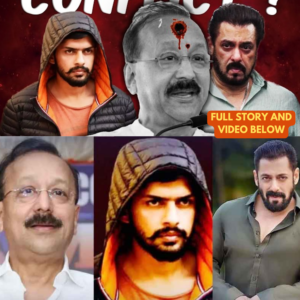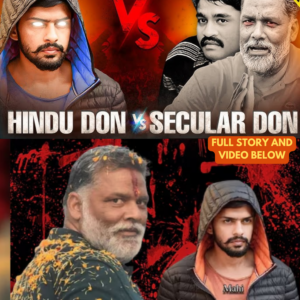In recent discussions surrounding the controversial figure Lawrence Bishnoi, Bollywood actor Salman Khan has found himself at the center of a heated debate. The speaker argues that while Khan may have made mistakes, traditional Hindu values encourage forgiveness, drawing parallels with historical figures like Prithviraj Chauhan, who famously pardoned his enemy, Muhammad Ghori, multiple times. This historical context is used to highlight the importance of mercy in the face of wrongdoing.
Yadav’s situation exemplifies a broader issue: the perceived ineffectiveness of the government in tackling criminal elements in society. The speaker critiques the administration for providing shelter to gangsters, suggesting that if addressing crime were straightforward, justice would not be delayed for years in high-profile cases. This reflects a growing frustration with systemic failures in maintaining law and order.
The narrative takes a turn as it emphasizes the need for the Sanatan Dharma community to rally together against perceived threats. Bishnoi’s actions are framed not just as personal vendettas but as battles for the integrity of the faith. The speaker insists that all followers of Sanatan Dharma must recognize their shared responsibility to defend their beliefs against anyone who would undermine them.
While the discourse is charged with emotional rhetoric, it also touches on a fundamental principle of Sanatan Dharma: non-violence. The speaker argues that true adherents should prioritize peaceful resolutions over violent confrontations, even when provoked. This philosophy serves as a reminder that the essence of their faith lies in compassion and restraint.
The discussion further delves into the implications of Bishnoi’s threats. By targeting individuals who disrespect cultural and religious values, Bishnoi positions himself as a protector of Sanatan Dharma. However, the speaker warns that such an approach risks endorsing a cycle of violence that contradicts the very teachings of their faith.
Amidst this turmoil, the speaker highlights the need for clarity and introspection within the community. There is a call to acknowledge that engaging in violent retribution, as Bishnoi advocates, ultimately undermines the principles of compassion that Sanatan Dharma espouses. The internal conflict between defending one’s beliefs and resorting to violence poses a significant challenge.
As the dialogue continues, the speaker urges caution against rash actions fueled by anger or a desire for revenge. Rather than following Yadav’s lead into confrontation, the community is encouraged to focus on strengthening their values and promoting peaceful coexistence. This approach aligns with the deeper teachings of Sanatan Dharma, emphasizing that true strength lies in restraint.
The narrative concludes with a powerful reminder that the fight for justice and honor should not lead to the abandonment of fundamental principles. Instead, followers of Sanatan Dharma must strive to embody the values of peace, compassion, and forgiveness, even in the face of provocation. The path forward requires a commitment to these ideals, ensuring that the community does not lose sight of what it stands for in the heat of conflict.
In summary, the issues surrounding Lawrence Bishnoi and Pappu Yadav reflect broader societal challenges. The importance of adhering to the core values of Sanatan Dharma, especially in turbulent times, remains a crucial takeaway for the community.
News
Amitabh Bachchan behaved badly with his daughter-in-law Aishwarya Rai | Amitabh IGNORE Aishwarya Rai
In recent weeks, a wave of speculation has emerged suggesting that all may not be well between former Miss World Aishwarya Rai and the iconic Bachchan family. This speculation has captured the attention of fans and the media, as rumors…
Amitabh gave a message to daughter-in-law Aishwarya Rai, said “No matter how your house is, it is yours”
Amitabh Bachchan, the iconic figure of Indian cinema, has a longstanding tradition of engaging with his audience through social media. He often shares reflections on his life, career, and personal philosophies. Recently, a particular post of his has stirred significant…
Salman Khan vs Lawrence Bishnoi | Why it is Happening? |
Salman Khan vs Lawrence Bishnoi | Why it is Happening? | The tension between Bollywood superstar Salman Khan and gangster Lawrence Bishnoi has become a hot topic in recent news. This clash is not just a simple feud; it embodies…
Lawrence Bishnoi Vs Pappu Yadav | Bishnoi Targets Anti-India Mafia?
In the ever-evolving landscape of India’s criminal underworld, a new chapter is unfolding, marked by the dramatic confrontation between notorious gangster Lawrence Bishnoi and the infamous Bihar don, Pappu Yadav. This rivalry has escalated recently, with Bishnoi’s gang issuing a…
LAWRENCE BISHNOI VS SALMAN KHAN, PAKISTANI PUBLIC REACTION AFTER NADEEM KHAN VIRAL VIDEO, REAL TV
The recent controversy involving Bollywood superstar Salman Khan and Lawrence Bishnoi has sparked intense discussions across communities, especially concerning allegations of animal cruelty. The speaker, representing a particular community, emphasizes that if there is evidence that Khan has harmed a…
LAWRENCE BISHNOI’S DIWALI GIFT TO PAPU YADAV LIVE, AFTER NADEEM KHAN & SALMAN KHAN, LATEST NEWS
In a recent live discussion, significant attention was drawn to the ongoing tensions surrounding Pappu Yadav and Lawrence Bishnoi, especially in light of recent developments involving prominent figures like Nadeem Khan and Salman Khan. The speaker began by addressing the…
End of content
No more pages to load











